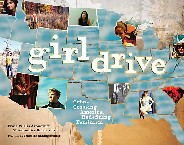In the fall of 2007, two 23 year olds, Emma Bernstein and Nona Willis Aronowitz set out on a road trip across the U.S. to ask 20 somethings what feminism means to them. They interviewed about 250 women in 25 cities, and their story is told in the new book, Girldrive: Criss-Crossing America, Redefining Feminism.
Reading about their story made me think of one of my feminist heroes, and wonder if they or those they interviewed knew about her: Estelle Griswold. She was a dogged, driving force behind overturning laws that banned the use of contraceptives.
In 1965, she was the Executive Director of Planned Parenthood League of Connecticut. She and Dr. C. Lee Buxton, a physician and professor at the Yale School of Medicine, decided to test the constitutionality of the Connecticut law banning contraception (in place since 1879), by opening a birth control clinic. They were tried and found guilty, and the conviction was upheld in Appellate Division of the Circuit Court, and by the Connecticut Supreme Court. Griswold appealed her conviction to the U.S. Supreme Court, and it concluded that 1879 Connecticut Statute was unconstitutional on the grounds that it violated the “right to marital privacy.” Evan Wolfson states in Why Marriage Matters, this decision meant that “The Court recognized <in Griswold> the right not to procreate in marriage.”
Griswold was an instrumental force in helping women gain control over their reproductive lives. Keeping this control, to me, remains part of the meaning of feminism. To Bernstein and Aronowitz, being feminists is “being conscious of and angry about gender injustice” and “being conscious of how your gender affects your life and how it affects our laws and social norms.” I think their predecessors would have agreed with them.
On their road trip they learned there are a lot of misconceptions out there, even “among smart, irreverent and socially aware women.” It surprised them that women were bogged down by negative associations they have with feminism and what they think it means academically. They also found that in economically depressed areas, young women saw feminism as “elitist.” But of Southern women in conservative states, they found they were the most “forward thinking..had fresh and fierce ideas, and weren’t stuck in the same feminist boxes.” Griswold would have loved that for sure!
For childfree women, gender identity issues remain a part of feminism that needs further exploration and definition. The question, “What does it mean to be a woman if you do not become a mother?” has not really been answered. Mardy Ireland, in Reconceiving Women takes it on in for the first time in1993. Maybe it is time to take this question on the road to childfree women!
Childfree women – we are examples of women who have separated motherhood from female identity..but how would you characterize our female identity? Love to hear your thoughts!


My female identity is to me exactly what my human identity is. I don’t think that we should generalize anything, and when one uses the word “identity”, one should always use it in relation to a single person. My identity as a woman is that I’m smart, open-minded, sometimes temperamental, other times childish and yet very level-headed. sometimes jealous, other times selfish and always full of love
I like your thinking of keeping it to “human” identity– this takes anything related to “gender” out of it. But then I think– is there something lost there? Is there really no value in the differences in what people think it means to be a man vs a woman? ~L